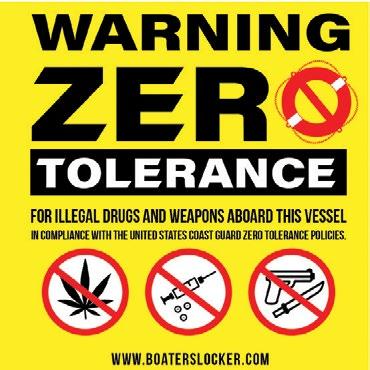
3 minute read
Safety First
No Boating For MJ Are cannabis and THC-laced products legal in your state? It’s different on the water.
At press time, the coronavirus pandemic was wreaking havoc on everything in our world, from the economy to our ability to gather with loved ones. Yet boating season is just around the corner, and we’re all hopeful that life will resume some degree of normalcy as spring gives way to summer.
Advertisement
To that end, we at Lakeland Boating would like to explore an issue that has been in the news quite a bit (at least until COVID-19 exploded on the scene): The legality of recreational cannabis use (widely known as marijuana) and possession in certain states, and what that means for boaters. Are the rules different when you cast off the docklines and head offshore?
Cannabis while underway The answer is a big, resounding yes. Once you motor into a navigable waterway, it’s a whole different ball game. Such waterways — from the Great Lakes to major river systems — fall under the jurisdiction of the U.S. government, not the individual states.
“The federal government has zero tolerance for marijuana,” says Terry Krieg of Advantage Marketing Solutions in Novi, Michigan. “I’m a longtime boater, I belong to two yacht clubs, and my firm works with the marine industry, so I’ve followed this issue with interest.”
Noting that he is not an attorney, “just a curious boater,” Krieg also observes, “If you’re boarded by the U.S. Coast Guard (USCG), it’s not the first thing they’re looking for, but they are looking. Right now, they’re not making it their No. 1 catch situation. But they could, and the law is on their side.”
Lieutenant Amy Hockenberry, chief of enforcement and station manager for the U.S. Coast Guard Sector Lake Michigan, agrees with this assessment. If boarding officers have reasonable suspicion or probable cause, she says, they will act on it.
“Safety and education are our priorities, not kicking down doors to look for drugs, unless we have intelligence-driven data or the boarding officer uses his or her authority based on what was observed, located, or tested,” she explains. “We want to see people enjoying the water, boating safely and being educated on the rules associated with operating a boat in the water.”
The USCG has the authority to board any boat subject to the jurisdiction of the U.S. at any time, in any place. It does not require a warrant, nor does it require probable cause. It could board a vessel simply to conduct a recreational safety boarding, in which the boarding officers check for required items, such as life jackets, state/certificate numbers, fire extinguishers and visual distress signals.
“If we see you operating a boat while drinking alcohol or smoking marijuana, then we will board your boat, conduct a recreational safety boarding, and evaluate our next course of action for the illegal activity observed,” Hockenberry says. “While aboard, if we observe or detect marijuana use, we will inquire and start an investigation. We will test the marijuana, seize it, and cite the owner/ operator and passengers accordingly.”
A field sobriety test most likely will be conducted, and the citation varies depending on how much is located and the results of the investigation. The USCG can cite you for Maritime Drug Law Enforcement Act (MDLEA) 46 USC 70503, for manufacturing, distributing or intending to distribute or manufacture, which is a felony. It can also site you for (MDLEA) 46 USC 70506(c), knowingly or intentionally possessing a controlled substance, which is a civil penalty of up to $5,000 per violation.
At anchor and at the dock Although you might have heard otherwise, anchoring isn’t the same as being on land. You don’t suddenly switch to state laws just because you’re on the hook.
“Here, too, we’re coming at this from a safety perspective,” Hockenberry says. “You had to get there somehow, and you still have to get back home.”
Krieg notes that reasonable questions do arise regarding boats in their slips at the marinas. The boat is floating, but it’s tied to the dock, and the dock is connected to land.
“We still have those questions, and at this point, I’m not sure if we have answers,” he says. “I suspect the dock issue may be defined by court cases happening down the road, but for now, it’s ambiguous. I would tell boaters to err on the side of caution.”
According to Hockenberry, the USCG’s first priorities for dockside boaters will be, again, to educate and to ensure safety.
“If you’re at the dock, and we see or smell marijuana, we’re going to talk with you,” she says. “You’re in the water, even if you’re not underway, and we want to determine what your intentions are.

